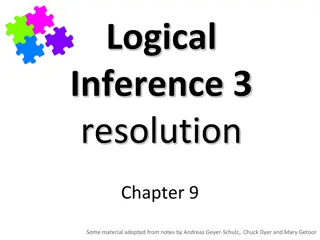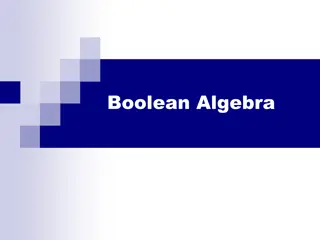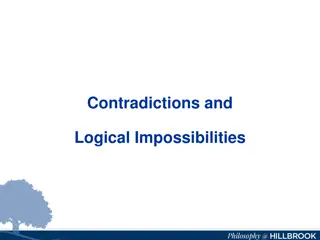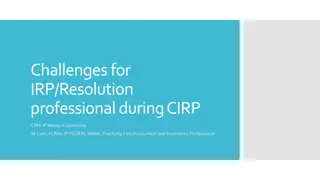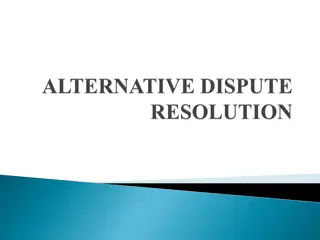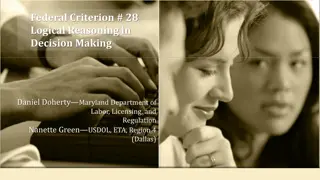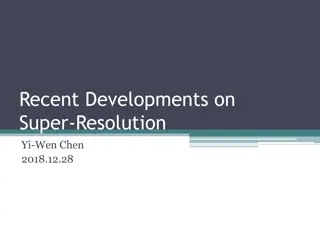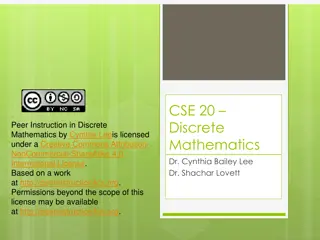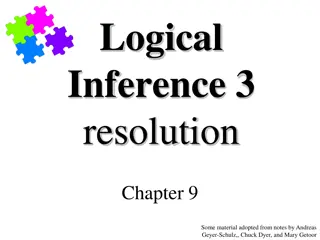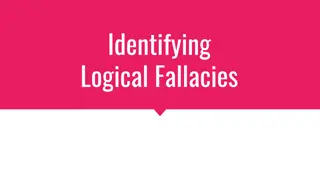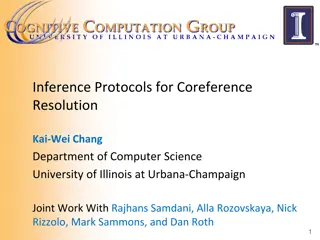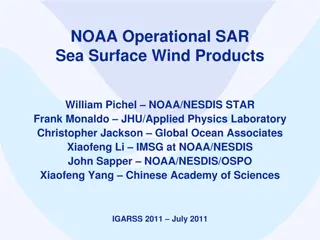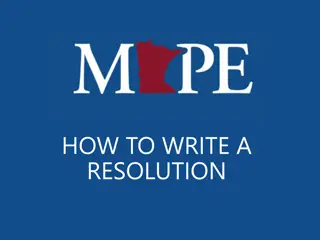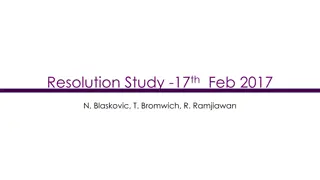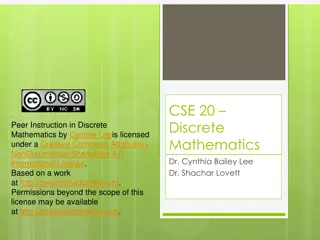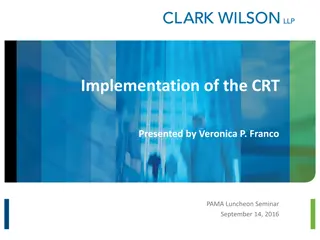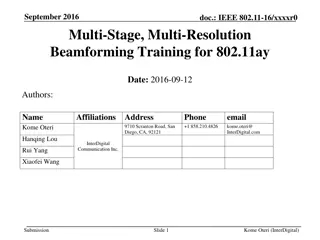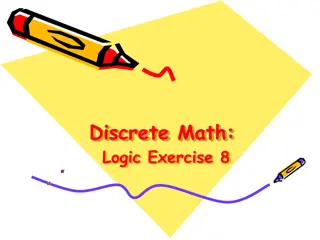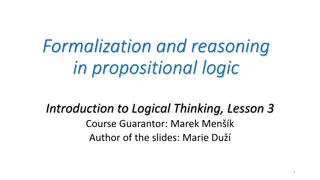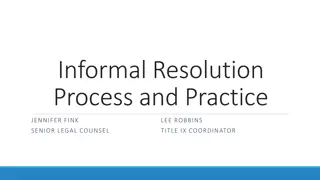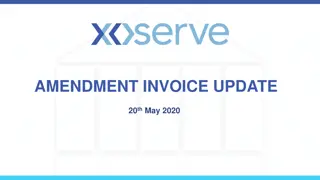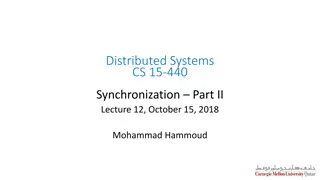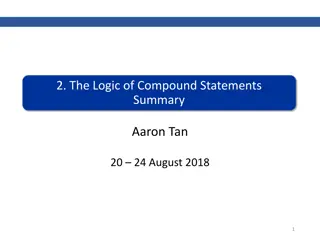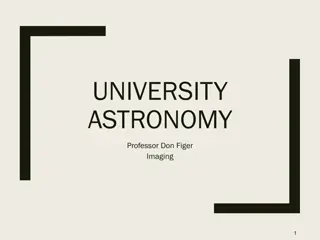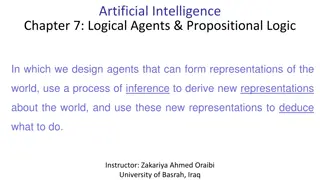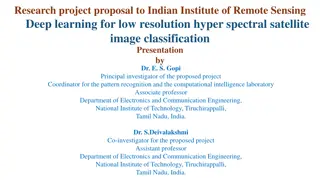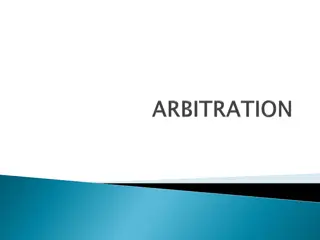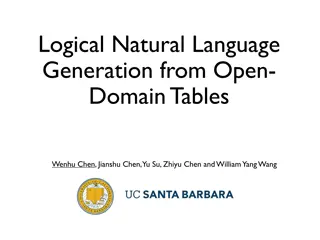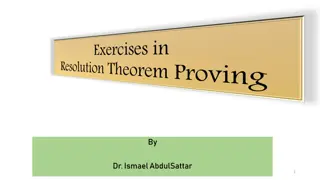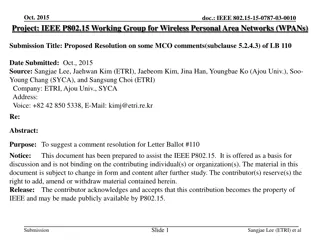Understanding Logical Form and Equivalence in Conditional Statements
Delve into the intricacies of logical form, equivalence, and compound statements in the realm of propositional logic. Explore valid and invalid arguments, conditional statements, and the logic of compound statements with puzzles to sharpen your logical reasoning skills. Unravel scenarios like determ
2 views • 81 slides
Progressive Approach to Relational Entity Resolution
In this research paper authored by Yasser Altowim, Dmitri Kalashnikov, and Sharad Mehrotra, a progressive approach to relational entity resolution is presented. The study focuses on balancing cost and quality in entity resolution tasks for relational datasets. The goal is to develop a method that ac
1 views • 20 slides
Understanding Resolution in Logical Inference
Resolution is a crucial inference procedure in first-order logic, allowing for sound and complete reasoning in handling propositional logic, common normal forms for knowledge bases, resolution in first-order logic, proof trees, and refutation. Key concepts include deriving resolvents, detecting cont
1 views • 12 slides
Logical Expressions and Symbolism in Sentential Logic
Understanding sentential logic, logical expressions, and symbols through examples of logical reasoning and inference. Explore the concepts of logical OR, AND, negation, and the complexities of inclusive and exclusive logic in various scenarios.
1 views • 33 slides
Understanding Boolean Algebra and Logical Statements
Introduction to Boolean algebra, logical statements, and compound statements. Explore the concepts of Boolean variables, logical operators, writing conventions, equivalence in Boolean algebra, and truth tables. Learn how to analyze and evaluate logical expressions using truth tables.
1 views • 25 slides
Exploring Contradictions and Logical Impossibilities
Explore a series of paradoxes and logical puzzles, ranging from being in two places at once to time travel conundrums. Discover the concept of contradictions and logical impossibilities through thought-provoking scenarios and riddles. Dive into the realm of impossibilities and challenge your underst
1 views • 6 slides
Challenges Faced by Insolvency Resolution Professionals during Corporate Insolvency Resolution Process
Insolvency Resolution Professionals encounter various challenges during the Corporate Insolvency Resolution Process, such as the need for prompt public announcements, appointing valuers, handling difficult transactions like preferential deals and related party transactions, assessing fraudulent acti
0 views • 8 slides
Innovative Dispute Resolution Mechanisms: ADR in India
The concept of settling disputes through Alternative Dispute Resolution (ADR) in India introduces non-adversarial mechanisms for resolving legal suits between parties. ADR encompasses negotiation, mediation, arbitration, conciliation, and case evaluation, offering a more collaborative approach to co
0 views • 16 slides
Enhancing Logical Reasoning in Decision Making Process
Federal Criterion #28 emphasizes the importance of stating logical reasons for decisions that align with findings of fact and conclusions of law. This criterion is key to ensuring fairness and accuracy in legal analysis. The scoring criteria, national appeals review results, and ways to improve scor
1 views • 8 slides
Effectiveness of Conflict Resolution Education in Schools
Conflict resolution education plays a crucial role in transforming school environments by reducing violence and promoting win-win outcomes. Various successful programs have shown significant improvements in school settings, such as reduced suspensions and conflicts among students. Conflict resolutio
9 views • 6 slides
Understanding Boolean Algebra and Logical Statements
Boolean Algebra allows for formalizing logical reasoning using variables that can be either true or false. It involves logical statements, compound expressions, logical operators like AND, OR, NOT, writing conventions, equivalence, and truth tables to determine the truth values of statements. By und
0 views • 25 slides
Recent Developments on Super-Resolution: A Comprehensive Overview
Super-resolution technology aims to reconstruct high-resolution images from low-resolution inputs, with applications in video surveillance, medical diagnosis, and remote sensing. Various convolutional neural network (CNN) models have been developed, such as SRCNN, VDSR, ESPCN, and FSRCNN, each with
0 views • 12 slides
Understanding Logical Connectives in Discrete Mathematics
Explore the world of propositional logic and truth tables in discrete mathematics through a peer-instruction approach. Learn about basic logical connectives, new connectives, complex formulas, operator precedence, and the nuances of implication (implies) with engaging examples. Delve into scenarios
0 views • 14 slides
Understanding Propositional Logic and Logical Operators
Learn about propositional logic, statements, logic operators, compound statements, exclusive-or, logical equivalence, and writing logical formulas for truth tables. Explore how to create compound statements for exclusive-or using different approaches and ensure logical equivalence. Enhance your know
0 views • 26 slides
Advancing Charged Particle Tracking Resolution in Particle Physics
Exploring the measurement of angle, curvature, and accuracy in charged particle tracking resolution within the CLAS Collaboration. The discussion delves into momentum resolution goals, ideal B-field alignment, and achieving 0.3% accuracy. Details on current momentum resolution, necessary steps for i
0 views • 19 slides
Understanding Logical Relations in Programming Languages
Explore the concept of logical relations in programming languages, focusing on the relation between high-level and low-level programs. Learn about contextual equivalence, its benefits and limitations, and how logical relations offer a robust framework for defining program equivalence. Discover why l
0 views • 18 slides
Understanding Logical Inference: Resolution in First-Order Logic
Resolution in logic is a crucial inference procedure that is both sound and complete for unrestricted First-Order Logic. It involves deriving resolvent sentences from clauses in conjunctive normal form by applying unification and substitution. This approach covers various cases such as Modus Ponens,
3 views • 12 slides
Understanding Laws of Logic and Logical Reasoning
Laws of logic play a crucial role in reasoning and making deductions. This comprehensive guide explains the use of contrapositives, examples of conditional statements, and the significance of laws like the Law of Syllogism. Understanding these principles helps in effectively analyzing statements and
0 views • 8 slides
Introduction to Symbolic Logic: Understanding Logical Inferences
Logic is the study of reasoning methods to distinguish between correct and incorrect arguments. Symbolic Logic involves representing logic symbolically for easier understanding and manipulation. Logical inferences help in making decisions based on reasoning chains. The content discusses the use of l
1 views • 28 slides
Identifying Logical Fallacies in Sources: Presentation Assignment
Learn to identify logical fallacies in various sources by analyzing passages and applying the Logical Fallacy Referee tool. Work in pairs to select sources, identify fallacies, and present annotated examples to the class.
0 views • 7 slides
Coreference Resolution System Architecture and Inference Methods
This research focuses on coreference resolution within the OntoNotes-4.0 dataset, utilizing inference methods such as Best-Link and All-Link strategies. The study investigates the contributions of these methods and the impact of constraints on coreference resolution. Mention detection and system arc
0 views • 18 slides
NOAA SAR High-Resolution Coastal Winds Overview
NOAA's Operational SAR Sea Surface Wind Products provide detailed information on wind patterns derived from SAR images. The system aims to implement high-resolution wind production, capable of deriving winds from various SAR satellites. The operational goals include compatibility with international
0 views • 28 slides
Guide to Writing a Resolution for Democratic Improvement
A resolution is a formal request to change constitutions, election rules, policies, or bylaws, considered by the Delegate Assembly as a democratic way to enhance a union. Locals, statewide committees, Board of Directors, and any two or more members can submit resolutions. Resolution writers have the
0 views • 33 slides
Analysis of Resolution Study and Charge Scans on 17th Feb 2017
Detailed analysis conducted on 17th Feb 2017 includes resolution calculations, charge scans, attenuation comparisons, and improvements in data fitting. The study compares measured resolutions with predicted scaling, examines the impact of additional information on fitting, and explores peak shifts i
0 views • 30 slides
Peer Instruction in Discrete Mathematics
Explore the world of discrete mathematics with Dr. Cynthia Bailey Lee and Dr. Shachar Lovett through peer instruction. Dive into topics like step-by-step equivalence proofs and the equivalence of logical operators. Discover the different methods to show propositions are equivalent and delve into log
0 views • 14 slides
Understanding the Civil Resolution Tribunal (CRT)
Civil Resolution Tribunal (CRT) is introduced as a place to resolve strata-related disputes in an accessible, speedy, and economical manner. It aims to encourage agreement between parties or decide claims. CRT's mandate includes providing fair dispute resolution services using electronic tools. The
0 views • 38 slides
Multi-Stage, Multi-Resolution Beamforming Training for IEEE 802.11ay
In September 2016, a proposal was introduced to enhance the beamforming training procedures in IEEE 802.11ay for increased efficiency and MIMO support. The proposal suggests a multi-stage, multi-resolution beamforming training framework to improve efficiency in scenarios with high-resolution beams a
0 views • 11 slides
Propositions and Logical Connectives Exercise Solutions
In this exercise, propositions involving grizzly bears, hiking safety, and ripe berries are formulated using logical connectives. Solutions are provided for various scenarios including conjunctions, conditionals, biconditionals, and more. The explanations offer a structured approach to understanding
0 views • 6 slides
Introduction to Propositional Logic: Formalization and Reasoning
Understanding formalization in propositional logic involves replacing atomic propositions with propositional variables and natural language connectives with logical connectives. The process abstracts from internal proposition structure, reducing meaning to True or False. The language allows formaliz
0 views • 18 slides
Understanding Informal Resolution Process and Practice in Grievance Procedures
Exploring the process of informal resolution in grievance procedures, focusing on mediation, confidentiality, impartiality, and neutrality. Parties can voluntarily engage in informal resolution before a formal determination, with specific requirements and timeframes outlined. Mediation fosters self-
0 views • 9 slides
Amendment Invoice Update Summary and Resolution Plan
Unique MPRNs with ASP mismatch issues were addressed, avoiding customer updates this month. An improved extraction process led to early file delivery and resolution steps cataloging was completed. Automation of exception resolution is in progress. Defect resolution was impacted by prioritization and
0 views • 10 slides
Understanding Distributed System Synchronization and Logical Clocks
Continuing from the previous lecture on time synchronization, this session delved into logical clock synchronization, mutual exclusion, and election algorithms in distributed systems. Logical clocks, such as Lamport's Clock and Vector Clock, play a crucial role in defining the order of events withou
0 views • 33 slides
Understanding Compound Statements in Logic
The summary discusses the logic of compound statements, covering logical form, equivalence, tautologies, contradictions, conditional statements, valid and invalid arguments, and more. It explains the definitions of statements, negation, conjunction, disjunction, statement form, logical equivalence,
0 views • 12 slides
Understanding Spatial Resolution in Astronomical Imaging
This lecture delves into the requirements for resolution and sensitivity in astronomical imaging, exploring factors such as spatial resolution, optical design aberrations, and noise sources. It explains how spatial resolution is crucial in distinguishing objects, discussing the Rayleigh criterion an
0 views • 45 slides
Understanding Logical Agents and Propositional Logic in AI
Designing logical agents involves forming representations of the world, using inference for deriving new insights, and deducing actions based on these representations. Knowledge Base (KB) is a crucial component, comprising known facts and current percepts to infer hidden states. Propositional logic,
0 views • 23 slides
Deep Learning for Low-Resolution Hyperspectral Satellite Image Classification
Dr. E. S. Gopi and Dr. S. Deivalakshmi propose a project at the Indian Institute of Remote Sensing to use Generative Adversarial Networks (GAN) for converting low-resolution hyperspectral images into high-resolution ones and developing a classifier for pixel-wise classification. The aim is to achiev
0 views • 25 slides
The essence of Arbitration: A Private Dispute Resolution Mechanism
Arbitration is a dispute resolution method where parties agree to have a neutral third party make a binding decision. It offers privacy, flexibility, and control over the process, allowing for a fair resolution without unnecessary delay. The process is initiated by mutual consent, and the parties ca
0 views • 79 slides
Advancements in Logical Natural Language Generation from Open-Domain Tables
Cutting-edge research in logical natural language generation (NLG) is transforming the field by moving beyond traditional surface realization to generate summarized text, conclude trends, and apply logical and mathematical operations. By addressing limitations such as lack of logical inference, summ
0 views • 33 slides
Logical Resolution Proofs and Exercise Solutions
This content provides exercises on logical resolution proofs and solutions, including proving that "West is a criminal" and resolving statements related to mortality, relationships, and more. It also covers converting statements to Conjunctive Normal Form (CNF).
0 views • 9 slides
Proposed Resolution on MCO Comments in IEEE P802.15 Working Group Document
The document presents a proposed resolution for comments on some clauses in the IEEE P802.15 Working Group document submitted in October 2015. The resolution addresses discrepancies and suggests revisions related to the transmission and scheduling of TC IE frames in wireless personal area networks.
0 views • 20 slides


